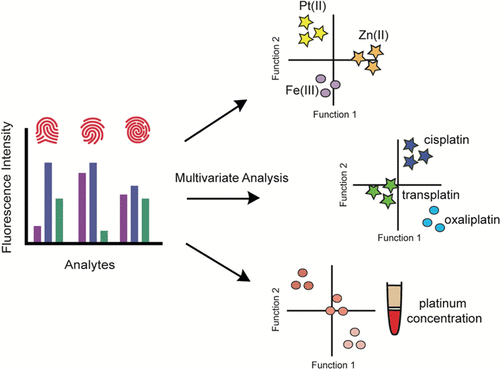Fluorescent approaches to study the biological interactions of cisplatin
Abstract
Cisplatin remains one of the most successful chemotherapeutic drugs worldwide, being used in the treatment of testicular and ovarian cancers. However, these treatments are regularly accompanied by side effects, which require dose reductions in the majority of patients. To improve these treatments, it is necessary to better understand the cellular effects of cisplatin treatment, and to develop methods to more accurately determine suitable dosages. We are addressing both of these challenges through fluorescent sensing.
In order to understand how cisplatin affects the chemistry of the cell, we have developed a series of selective fluorescent sensors that report on aspects of redox chemistry1 and metal homeostasis,2 as well as directly sensing platinum metabolites within the cell.3 To measure blood platinum levels, we have instead adopted an array-based approach, using a set of six cross-reactive sensors that can provide information about platinum levels in clinical samples.4

- Wang Z, Yeo JH, New EJ, Analysis & Sensing, 2021, 1, 90-94
- Shen C, Kolanowski JL, Tran C, Kaur A, Akerfeldt MC, Rahme MS, Hambley TW, New EJ, Metallomics, 2016, 8, 915-919
- Shen C, Harris BDW, Dawson LJ, Charles KA, Hambley TW and New EJ. Chemical Communications, 2015, 51, 6312-6314.
- Mitchell L, Shen C, Timmins HC, Park SB, New EJ, ACS Sensors, 2021, 6, 1261–1269
Biography
After undergraduate and Masters studies at the University of Sydney, Liz completed her PhD in 2010 at the University of Durham (UK) before taking a Royal Commission for the Exhibition of 1851 Postdoctoral Fellowship at the University of California, Berkeley. Since 2012, she has been an academic at the University of Sydney. Her research focusses on the development of small molecule fluorescent sensors for biological and environmental applications.
About School research seminars
Seminars cover all aspects of chemistry and molecular biosciences and are delivered by visiting national and international academics. PhD completion seminars are also incorporated into the program.
Seminars are usually held in person and occasionally via zoom. All are welcome to attend.
Contacts
- Chemistry: Dr Rowan Young, Dr David Cantillo
- Molecular Biosciences: Dr Mathew Jones
Venue
Please contact the convener for the password p.sharpe@uq.edu.au
